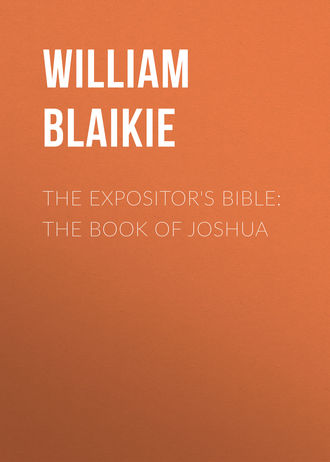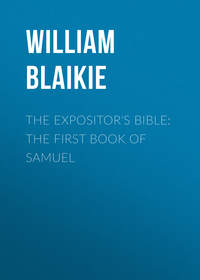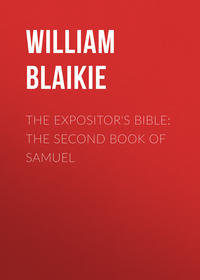 полная версия
полная версияThe Expositor's Bible: The Book of Joshua
So, too, churches should be divinely ruled. There is but one Lord in the Christian Church, He that is King of kings, and Lord of lords. There may be many details in Church life which are left to the discretion of its rulers, acting in accordance with the spirit of Scripture; but no church should accept of any ruler whose will may set aside the will of her Lord, nor allow any human authority to supersede what He has ordained.
And for individuals the universal rule is: "Whatsoever ye do in word or deed, do all in the name of the Lord Jesus, giving thanks unto God and the Father by Him." Each true Christian heart is a theocracy – a Christ-governed soul. Not ruled by external appliances nor by mechanical rules, nor by the mere effort to follow a prescribed example; but by the indwelling of Christ's Spirit, by a vital force communicated from Himself. The spring of the Christian life is here – "Not I, but Christ liveth in me." This is the source of all the beautiful and fruitful Christian lives that ever have been, of all that are, and of all that ever shall be.
THE END1
"The hand of Moses and Aaron brought the people out of Egypt, but left them in the wilderness, and could not seat them in Canaan… Joshua, the successor, only could effect that in which Moses failed… The death of Moses and the succession of Joshua pre-signified the continuance of the law till Jesus came… Moses must die that Joshua might succeed… If we look on Joshua as the judge and ruler of Israel, there is scarce an action which is not predictive of our Saviour. He begins his office at the banks of the Jordan where Christ is baptized, and enters upon the public exercise of his prophetical office. He chooseth there twelve men out of the people to carry twelve stones over with them; as our Jesus thence began to choose His twelve apostles… It hath been observed that the saving Rahab the harlot alive foretold what Jesus once should speak to the Jews – 'Verily I say unto you, that the publicans and the harlots go into the kingdom of God before you.'…"
2
"Can death itself when seen in the light of this truth [the adjustment of every being in animated nature to every other] be denied to be an evidence of benevolence? I think not. The law of animal generation makes necessary the law of animal death, if the largest amount of animal happiness is to be secured. If there had been less death there must also have been less life, and what life there was must have been poorer and meaner. Death is a condition of the prolificness of nature, the multiplicity of species, the succession of generations, the co-existence of the young and the old; and these things, it cannot reasonably be doubted, add immensely to the sum of animal happiness." – Flint's "Theism," p. 251.
3
See "The Empire of the Hittites." By William Wright, D.D., F.R.G.S. London, 1886.
4
The promise is not inconsistent with the fact that Joshua's troops were defeated by the men of Ai. In such promises there is an implied condition of steadfast regard to God's will on the part of those who receive them, and this condition was violated at Ai, not by Joshua, indeed, but by one of his people.
5
"For the Oracles of God: four Orations." Pp. 3-6.
6
It is somewhat remarkable that the present village of Riha, at or near the site of the ancient Jericho, is noted for its licentiousness. The men, it is said, wink at the infidelity of the women, a trait of character singularly at variance with the customs of the Bedouin. "At our encampment over 'Ain Terâbeh (says Robinson) the night before we reached this place, we overheard our Arabs asking the Khatib for a paper or written charm to protect them from the women of Jericho; and from their conversation it seemed that illicit intercourse between the latter and strangers that come here is regarded as a matter of course. Strange that the inhabitants of the valley should have retained this character from the earliest ages; and that the sins of Sodom and Gomorrah should still flourish upon the same accursed soil." – "Researches in Palestine," i. 553.
7
Stanley's "Sinai and Palestine," p. 303.
8
"Land and Book," vol. ii., pp. 460-61.
9
"Life of Rev. Charles Simeon," p. 125.
10
See Chapter XXXI., "Jehovah the Champion of Israel."
11
See Mozley's "Ruling Ideas in the Early Ages," p. 40.
12
"The People's Bible," by Joseph Parker, D.D.
13
It seems hardly necessary to notice an explanation of the phenomenon that has been made lately – to the effect that it was in the morning, not the evening of the day, that Joshua expressed his wish. It was to prevent the allied kings about Gibeon knowing of his approach that he desired the sun to delay his rising in the east, a desire which was virtually fulfilled by that dark, cloudy condition of the sky which precedes a thunderstorm. The natural sense of the narrative admits neither of this explanation of the time nor of the miracle itself.
14
Smith's "Bible Dictionary."
15
There is some difficulty in adjusting the three passages in which the settlement of Caleb is referred to. From this first passage of the three, we are led to think that it was before the tribe of Judah obtained its portion. Again, from chap. xv. 13 we might suppose that it was simultaneously with the rest of the tribe. From Judg. i. 10, again, it might be thought that the subduing of the natives in Hebron was effected, not by Caleb alone, but by the tribe of Judah, and that it took place "after the death of Joshua" (Judg. i. 1). Putting all these together, it would appear that Hebron was assigned to Caleb before the tribe of Judah was settled; that this allocation was ratified at the general settlement; that as Caleb was a member of the tribe, his services against the Canaanites, and especially the Anakim, were ascribed to his tribe; and that the process of dispossessing the Canaanites went on for some time after the death of Joshua. The repetitions in the narrative concerning Caleb form one of the considerations that favour the idea of more sources than one having been made use of in the composition of this book.
16
Some readers may no doubt prefer the explanation that when Caleb is mentioned alone one document was followed, and when Caleb and Joshua are coupled, another.
17
See Wines on the "Laws of the Ancient Hebrews," p. 388.
18
Judg. x. 4; Ruth ii. 1; 1 Sam. xxv. 2; 2 Sam. xvii. 27.
19
See the author's essay "An Old Key to our Social Problems" in "Counsel and Cheer for the Battle of Life."
20
We do not encumber our exposition with a discussion of the extraordinary theory of Wellhausen, to the effect that Judah and Simeon, with Levi, were the first to cross the Jordan and attack the Canaanites; that Simeon and Levi were all but annihilated; that Joshua, who belonged to the tribe of Ephraim, did little more than settle that tribe; and that there was hardly such a thing as united action by the tribes, most of them having acted and fought at their own hand. This theory rests professedly on the ground that Judges i. is a more true and trustworthy account of the settlement than the narrative of Joshua. It is a strange proof of the greater truthfulness of Judges that, according to this theory, its very first statement should be a lie – "It came to pass after the death of Joshua!" The narrative of Judges naturally follows that of Joshua because it is plain that while Joshua secured for his people standing ground in the country, he did not secure undisturbed possession. Joshua set them an example of faith and courage which, if followed up by them, would have secured undisturbed possession; but with few exceptions they preferred to tolerate the Canaanites at their side, instead of making a vigorous effort to dispossess them wholly.
21
Stanley's "Sinai and Palestine."
22
Founding on the expression, "having lighted off her ass", some have thought that she feigned to fall off, and that her father coming to help her in the compassionate spirit one shows in a case of accident, she took the opportunity to ask and obtain this gift. The explanation is far-fetched if not foolish. Her dismounting is explained by the universal custom when one met a person of superior rank. Comp. Gen. xxiv. 64. See Kitto's "Pictorial Commentary."
23
Conder's "Handbook to the Bible," pp. 213, 214.
24
A proof that Joshua was written before the time of David.
25
These frequent references do not prevent modern critics from affirming that the cities of refuge were no part of the Mosaic legislation. They found this view upon the absence throughout the history of all reference to them as being in actual use. They were not instituted, it is said, till after the Exile. But the very test that rejects them from the early legislation fails here. There is no reference to them as actually occupied in the post-exilian books, amounting, as these are said to do, to half the Old Testament. Their occupation, it is said, with the other Levitical cities, was postponed to the time of Messiah. The shifts to which the critics are put in connection with this institution do not merely indicate a weak point in their theory; they show also how precarious is the position that when you do not hear of an institution as in actual operation you may conclude that it was of later date.
26
Gregorovius, "Wanderings in Corsica."
27
"Pulpit Comment.," in loco.
28
Ramathaim and Ramah are used interchangeably (1 Sam. i. 1 and 19, ii. 11).
29
"The People's Bible," by Joseph Parker.




